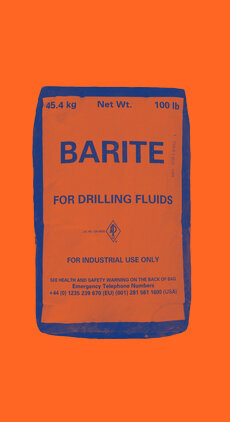With Federal water-based drilling fluid systems, you get the performance of oil-based fluids with the environmental acceptability of water-based fluid.
M-I GEL viscosifier is a premium-grade bentonite (a sodium montmorillonite clay) that will yield 91 to 100 bbl of 15-cP mud per ton [1.7 m3/100 kg].
It is used as a primary filtercake-building, filtration-control and suspension agent in freshwater systems, and has application in all water-based drilling fluid systems. M-I GEL viscosifier is a high-quality product which meets the ISO 13500 Clause 9 (formerly known as API Spec 13A, Section 9) specifications for bentonite.
This viscosifier is used to increase viscosity and reduce fluid-loss in water-based drilling fluids. It is a cost-effective means of achieving viscosity, fluid-loss control, and filtercake quality in freshwater and seawater muds.
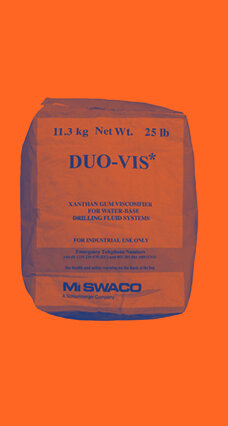
DUO-VIS biopolymer viscosifier is a dispersible, non clarified, high-molecular-weight biopolymer used for increasing viscosity in water-based drilling fluid systems.
Small quantities provide viscosity and weight material suspension for all water-based mud systems. DUO-VIS biopolymer has the unique ability to produce a fluid that is highly shear-thinning and thixotropic.
The primary function of DUO-VIS biopolymer is to increase viscosity for cuttings transport and suspension. It performs effectively in all water-based fluids, ranging from highly weighted to low-solids systems. This includes freshwater, seawater, salt, and heavy brine fluid systems.

M-I PAC UL additive is designed for situations where filtration control is needed with only minimal increases in rheology. M-I PAC UL additive will perform well in all brine applications, especially saltwater-based fluids. This additive can be used at all densities in either dispersed or nondispersed systems, and will encapsulate solids to control dispersion of active shale.
M-I PAC UL additive controls fluid loss in freshwater, seawater, KCl, and salt water. It also aids in the formation of a tough, thin filtercake to minimize the potential for differential sticking.
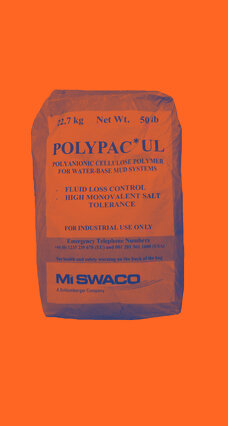
Soda ash is the common name for sodium carbonate (Na2CO3). It is a weak base that is soluble in water and dissociates into sodium (Na) and carbonate (CO3) ions in solution.
Calcium is present in many makeup waters and formations. It can cause flocculation of the mud, resulting in increased rheology, gel strengths, and fluid loss. High-filtrate calcium causes precipitation of calcium-sensitive additives, such as POLY-PLUS high-molecular-weight liquid clay inhibitors and ringfree polymeric thinners, which are the most sensitive. Cellulosic polymers are only slightly calcium-sensitive and tolerate moderate levels of filtrate calcium.
Applications
Reduce soluble calcium in water-based muds
Increase pH
Flocculate spud muds
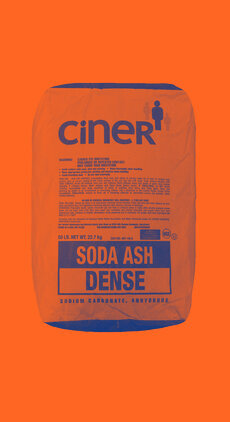
SP-101 water-based-mud fluid loss control additive is a medium-molecular-weight, anionic additive used to reduce fluid loss in freshwater and seawater muds. This synthetic additive has a high temperature limit and is not subject to bacterial degradation.
Advantages
Reduces fluid loss and improves filtercake quality
Thermally stable to >400 degF [>204 degC]
Not subject to bacterial degradation
Stabilizes flow properties in environments in excess of 400 degF [204 degC]
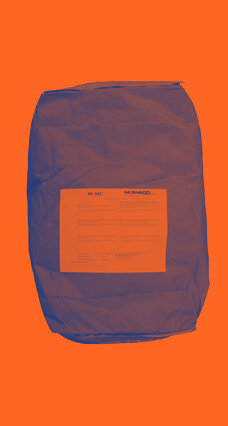
Asphasol Supreme sulfonated-asphalt shale inhibitor is used to aid in stabilizing shale sections, controlling solids dispersion and improving filtercake characteristics. It is also used as a supplemental high-temperature fluid-loss additive for water-based drilling fluid systems.
Asphasol Supreme inhibitor is a free-flowing powder and can be added directly to the mud system through the mixing hopper. It is not necessary to premix ASPHASOL SUPREME inhibitor with oil. It contains no surfactants.
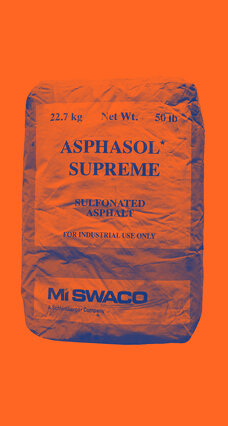
M-I WATE barite is a high-quality, drilling-grade barium sulfate used to increase the density of drilling fluids. This high-specific-gravity mineral is the most widely used weight barite, has application in all drilling fluid systems, and meets all API specifications for barite except density.
